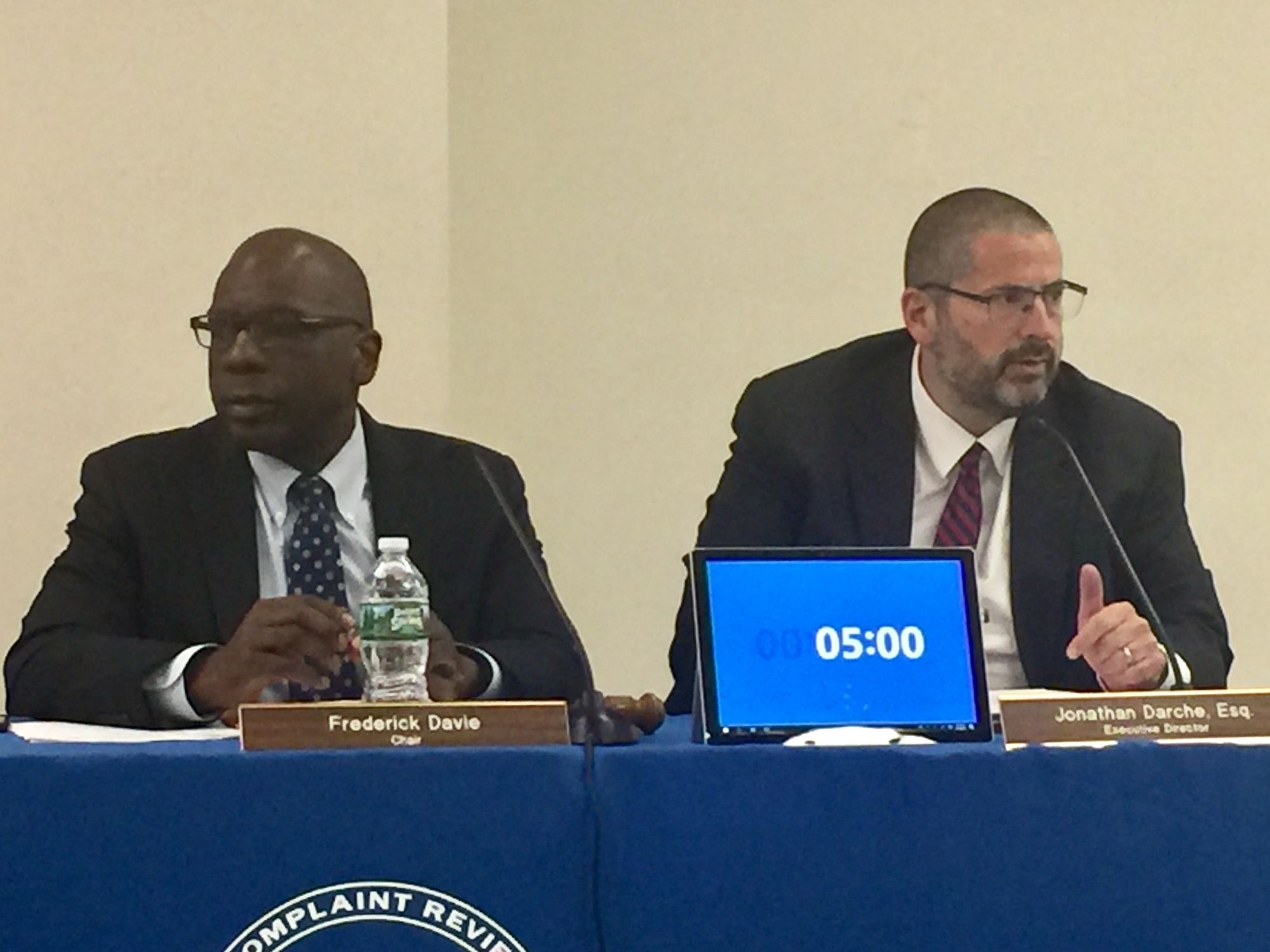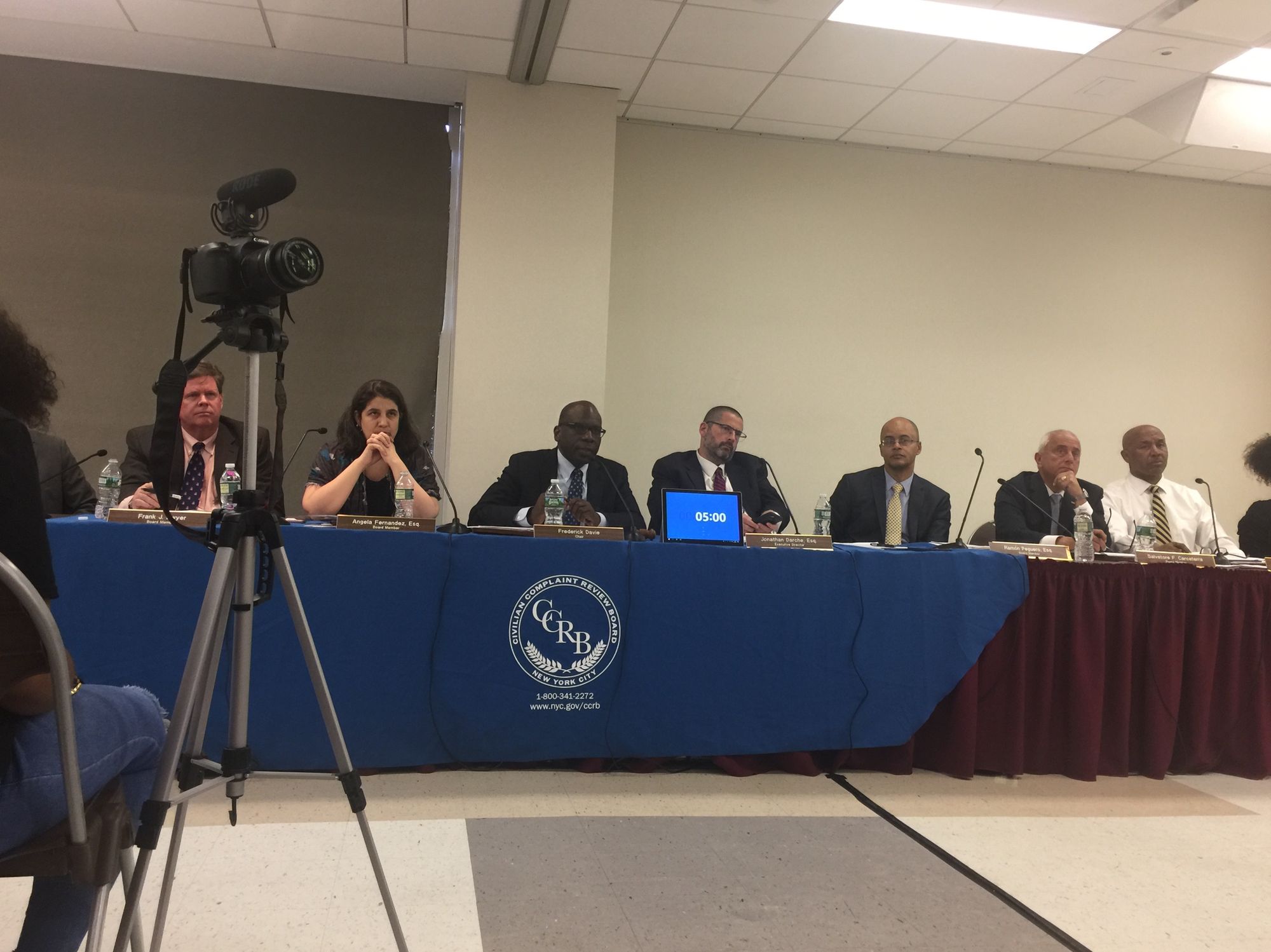Body Cameras, Community Policing and Transgender Issues Dominate CCRB Community Meeting


FLATBUSH – NYC Civilian Complaint Review Board (CCRB), an independent agency that investigates complaints against NYC police officers alleging the use of excessive or unnecessary force, abuse of authority, discourtesy, or the use of offensive language (FADO) held a community meeting at Brooklyn College on Wednesday, May 11.
Talk was all about neighborhood policing, body cameras, racism in the NYPD, and the mistreatment of transgender people, and lasted two and a half hours.

While the Board had a comment for all of the speakers, with an exception to Barry Spitzer, district manager of CB12 who only complimented the board, it didn’t have a comment for Jennifer Henry, a 24-year-old member of the public who spoke about police-involved shootings, specifically Eric Garner, Trayvon Martin, and Saheed Vassell, who was shot and killed in Crown Heights and did not believe the body cameras were any good.
Body Cameras
The role of body cameras was continually brought up by the speakers. Some wanted to know who had control over them, while others stated what they thought.
“My issue is a little more deeper – as to who controls the cameras,” Chris Banks, the executive director of East NY United Concerned Citizen Inc. said. “There has been no outreach to the communities to let folks know… that if an officer walked up to them, and the camera was off, they can actually request that the cameras be turned on.”
According to Darche, officers are “supposed to turn on the camera when they are leaving roll call at the beginning of their shift.” When the camera is turned on, he said, it is buffering every 30 seconds. When an encounter comes that would require the cop to record, the cop will activate the camera and it would record the incident until the recording is stopped.
Body cameras can play an important role when the CCRB reviews cases. “If we find that officers did not properly operate their body-worn camera, we will note that misconduct and refer to the Department for discipline,” he said.
Henry didn’t agree. “You shouldn’t have to wear body cameras. Why do you need to have a camera on you? You’re a cop to protect me,” she said. “I need you to have a camera on you? And you have complete control over this camera? How does that help me one bit?”

Community Policing
Many community members at the meeting believed the NCO program wasn’t working Neighborhood coordination officers (NCO) are dedicated police officers assigned to each sector within participating precincts. The program was implemented at 70th Precinct two years ago and will be at every precinct by the end of the year.
Phyllis Brockett, the president of Linden Houses, said residents complain that cops sit in their cars instead of interacting with the community.
“If any incidents occur within our community, [residents] can feel free to speak with them,” Brockett said, “but they don’t get that opportunity because [cops] don’t get out of their police car; they sit there, and I guess they observe what’s been going on.”
Darren Goodman, the program manager at Gangstas Making Astronomical Community Changes, relayed the messages he received when he canvassed the youth in his community. He said the youth didn’t have a relationship with the NCO in the community.
“The youth would like the NCO to get in touch and get in tuned with them,” Goodman said. “They could canvas the community, visit the churches, synagogues, parks… don’t only show up when something negative happens, show face and take part when positive things are happening in the community.”
“If these are our community officers, they should be a part of the community. The youth should know them, the business owners should know them, the community organizations should know them.”

Transgender Issues
LaTravious Collins, a transgender woman, spoke about the relationship between cops and members of the transgender community.
“My experience with law enforcement has taught me that I never get to be the victim,” she said. “I’m never heard enough, or beat up enough, or scared enough, or worried enough, or human enough.”
“I have learned that serving and protecting is an option the officer can choose to endorse or not endorse on a case by case basis. And my cases as a transgender woman… usually don’t count. They don’t count when I’m attacked, they don’t count when I’m assaulted, they don’t count when I’m harassed, they don’t count when I’m followed, they don’t count when I’m beat up, they don’t count when I’m violated, they don’t count when I’m raped, and they definitely don’t count when I’m trans which is every day, all day.”
Just two months ago, a cop allegedly harassed a transgender woman during a stop, the NY Post reported. Two years ago, a transgender man was attacked by a group of people in Park Slope.
She spoke about how transgender women are literally fighting for their lives alone, and that she’s learned to not call the police in her time of need because “they look back at me and think I’ve gotten what I’ve deserved.”
When it comes to policing in her community, Collins said “I want to be seen by them. I want to be human enough to deserve your service and protection. I want them to care enough to write down the evidence and actually pursue the assailant. I wanna feel safe when they leave, I wanna feel safe when they come. I want to be respected. I want to be addressed by the pronouns I prefer without condescendence and judgment.
And I want to be worthy of your service and protection.”



